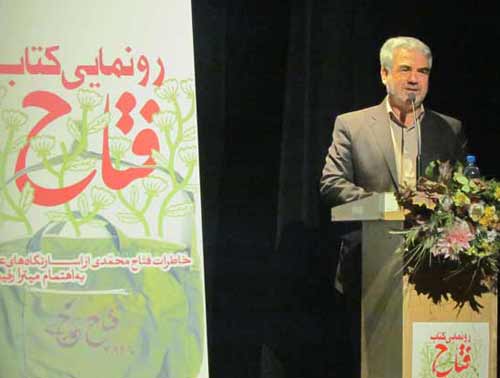Launch of Memoirs of Fattah Mohammadi
Writing Memoirs with Oral History Approach
Marjan Mir Qaffari
Translated by Natalie Haghverdian
2016-2-21
“No one had the strength to talk. Sitting in silence we were communicating with eyes. The sorrow of losing friends on one hand and our destiny unknown on the other had upset my mind. Still and quiet I was leaning to the corner of the trench when suddenly a mortar exploded nearby. Everything went dark. I passed out and came through when Iraqi soldiers were trying to pull me out of the trench. Couldn’t open my right eye and something had stock to my eyelid. I touched .my face to clean my eye. I touched it. It was soft. When I looked, it was a piece of meat from my martyr comrades.”
The narrative above represents a glimpse of the book “Fattah: Memoirs of Fattah Mohammadi in prisons of Iraq” which was launched on February 9, 2016 in Art Department of Mehr Hall attended by the Chief of Art Department and some other stakeholders and enthusiasts of Holy War books.
The book was published by the support of Culture and Sustainability Study and Art Department of Kohgiluyeh and BoyerAhmad Provinces by Soreye Mehr Publication as a first edition. Mitra Rafiyi has compiled memoirs of Dr. Fattah Mohammadi during the war imposed by Iraq in “Fattah” book.
Despite the fact that the narrative prose is close to fiction, all events are real and free from any imaginative and literary artifice; the story is all the narrator recounts as oral history. In other words, the book is a memoir with oral history approach.

Fattah Mohammadi, narrator
Mitra Rafiyi in her interview with the report of Iran Oral History Site stated that the methodology in “Fattah” is oral history and emphasizes that first a documentary interview was conducted with the narrator and then research, clarification and interview with comrades and friends of the narrator.
She stated that the experience as obtained in compilation of memoirs of Fattah Mohammadi were highly effective and stressed that in her new survey and work which includes memoirs of Hassan Vakili she will adopt oral history methodology. This is due to the fact that oral history methodology addresses the need of the people today to know the truths of war.
Mohammad Qassemi Pour, management of cultural and stability studies of provinces covered by Art Department stated that this book is the second national vertu of Kohgilouyeh and BoyerAhmad province; the first one to be "The Foot that Left Behind" which is published by Sourye Mehr Publication. He stressed that compilation and recording of memoirs in “Fattah” is based on oral history approach and said: “The initial work to compile memoirs of Fattah Mohammadi, based on oral history approach, started in Office of Cultural and Stability Studies of Yasouj. Approximately thirty to forty hours of interview was conducted and when the script was prepared, review and technical work was done. Then approximately ten hours of complementary interviews were conducted.”
Qassemi Pour addressed an issue that the author has indicated in preamble of her book and said: “during the first interviews, the narrator was the sole speaker, but in time more interaction was established and turned into oral history methodology and the final product was presented in the form of oral histories of Mr. Mohammadi. In other words, the questions presented by the researcher are omitted and the format is not oral history; however the methodologies in recording and compiling memoirs are in the form of oral history.”
Hence, we hope that in new activities in Imposed War Literature and the Holy Defense, will be further associated with oral history. Since this approach will present the real ambiance of the time to the audience seeking to understand the truths.
Number of Visits: 4694








The latest
- Oral History Methodology/National Archives and Library Organization of Iran, Archives Research Institute
- Third Regiment: Memoirs of an Iraqi Prisoner of War Doctor – 10
- 100 Questions/9
- Oral History News – Aban 1404
- The Relationship between “Religious Jurisprudence” and “Oral History”
- Third Regiment: Memoirs of an Iraqi Prisoner of War Doctor – 9
- 100 Questions/ 8
- Pak-Setan (Clean-Seeker)
Most visited
Challenges of Interviewing in Oral History
After years of studying the theoretical foundations of oral history, conducting numerous interviews and going through their post-interview stages, as well as reading the available body of oral history literature, I was eventually given the opportunity to evaluate the edited versions of dozens of oral history projects.Comparing the Narratives of Commanders and Ordinary Combatants in the Sacred Defense
An Analysis of Functions and ConsequencesThe experience of the Sacred Defense cannot be comprehended merely through statistics or official reports; what truly endures from war are the narratives of those who stood upon its frontlines. These narratives, however, vary significantly depending on one’s position, responsibilities, and lived experience.
Unveiling of the book "Oral History: What and Why"
The First report: Alireza KamariAccording to the Oral History website, the unveiling ceremony of the book "Oral History: What and Why" by Hamid Qazvini was held on Sunday evening, November 24, 1404, in the presence of experts in the field of oral history in the Salman Farsi Hall of the Arts Center.


